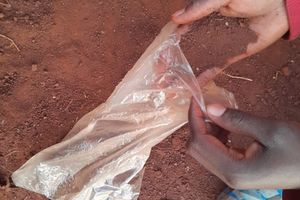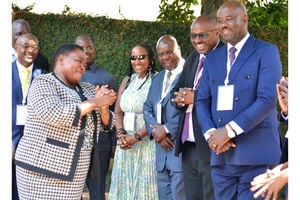
The Prime Minister, Ms Robinah Nabbanja (left), speaks to banana farmers during an agriculture expo in Masaka District on June 30, 2024. PHOTO | ISSA ALIGA
In a dramatic, yet hilarious, and perhaps odd proposal, Prime Minister Robinah Nabbanja has now suggested a unique way of forcing Ugandans out of poverty.
Her unique proposition is that the government will be compelled to ask Ugandans who have failed to embrace various government projects to get out of poverty to record statements at police stations.
Ms Nabbanja said it is self-defeating for people to just look on as poverty alleviation programmes that include the Parish Development Model (PDM), Emyooga, and Uganda Women Entrepreneurship Programme (UWEP} are being rolled out across the country and they deliberately fail to empower themselves economically.
“The government has done so many things, but our common people, have not got rich. If they don’t want to get rich in peace, we shall make you rich by force. We shall take you to the police and make a statement on why your brother is rich as you remain poor. Yes, you will make a police statement explaining why you got the PDM money but never got rich, why you got the Emyooga money but remain poor.
“You have land amounting to five, or six acres but you are not using it, are we together.? We are now talking humbly but time will reach and we say, ‘we want rich people’. Our master, the President loves you so much that is why he brought these various poverty alleviation programs like PDM, Emyooga, for women....’’ Ms Nabbanja said while launching the Semwanga Development Foundation in Rakai District on Saturday.
The development foundation is the brainchild of Buyamba County legislator, Mr Gyaviira Ssemwanga.
Ms Nabbanja also regretted that fishermen have been left out under the various government programmes, but she said this time round they would be financially supported.
“The President has already ordered the Ministry of Agriculture to support fishermen who were chased away from water bodies over illegal fishing so that they can acquire recommended fishing gear and boats,” she said.
Interestingly, President Museveni in 2021, at the naming of his new Cabinet to run his sixth elective tenure in office, dubbed it a Cabinet of “fishermen.”
He said they were in touch and in sync with the minds and needs of common Ugandans, unlike their predecessor cabinet that was elitist and aloof.
“On the issue of the proposed Cabinet, I decided to surprise everybody as Jesus [Christ] did. When Jesus started his movement, there were intellectuals like the Pharisees, but he went for the fishermen,” Mr Museveni said.
Ms Nabbanja succeeded premier Dr Ruhakana Rugunda, and before him was Amama Mbabazi, who came after Prof Apolo Nsibambi.
Ms Nabbanja, who is fondly referred to as majegere or bulldozer, is known for her jerky and spur-of-the-moment handling of public affairs.
In July 2021, the premier threw out an assortment of cheap relief items meant for flood victims in Kasese District. This was quickly followed by the arrest and charging of three OPM staff with corruption and abuse of office.
In September 2021, Ms Nabbanja personally carried emergency relief items to flood victims in Kayunga District, sidestepping the line ministers.
Little wonder that during her tour in Greater Masaka sub-region at the weekend, Ms Nabbanja suspended the disbursement of PDM funds to Masaka District following complaints from residents that some beneficiaries don’t fall in the category of people being targeted under the programme.
The residents said some of the beneficiaries are rich large-scale coffee farmers and dealers instead of the poor who are subsistence farmers.
“The government is struggling to ensure that 39 percent of the rural poor households are lifted from subsistence economy to commercial production, but it is the rich people in Masaka who are benefiting. What are the parish chiefs and top district officials doing to ensure this money goes to the rightful beneficiaries?’’ Ms Nabbanja asked.
The premier, who was officiating at an agricultural expo for Masaka District organised by the Office of the Prime Minister at Kamuzinda Village on Sunday, ordered: “I’m directing that distribution of these funds [PDM funds] is suspended and the parish chiefs investigated for failing to do their work.”
She ordered Ms Teopista Senkungo, the Masaka Resident District Commissioner, to take over the responsibility of verifying the right beneficiaries before payouts resumes.
Ms Nabbanja instructed Mr Haruna Kasolo, the state Minister for Micro-finance, who was in attendance, to visit all parishes in Masaka District and find out what went wrong with the PDM programme and file a report.
Mr Joseph Kamoga, 52, of Kamulegu Village, told Ms Nabbanja that he was deliberately left out of the PDM programme yet the parish chief had included his name on the list of beneficiaries.
‘‘I am among the poor in our village with only two pigs. I wanted to get the money to improve my piggery project so that I could increase my household income, but I didn’t get the money,’’ he said.
Mr John Henry Wasswa Ssempijja, the Masaka District Commercial Officer, said the district has 460 PDM beneficiaries in 18 parishes, with 361 of them female and 99 male. Some of the selected enterprises include poultry, banana, maize, dairy farming, rabbit rearing and passion fruit growing, coffee, and piggery.
Ms Nabbanja advised farmers to utilise their small pieces of land to plant high-value crops like coffee that would help them earn richly from their produce and save part of the money.
“You should emulate President Museveni’s one-acre model so that you earn highly from the small piece of land,’’ she advised.
Background
The PDM programme that was rolled out in 2022 aims to get 39 percent of poor households into the money economy.
From the outset, a section of Ugandans, especially Opposition politicians, have expressed skepticism on whether PDM will achieve the desired goal of lifting households out of poverty.
The government is expected to splurge Shs1 trillion annually on the programme intended to use a bottom-up approach. Each parish is expected to receive Shs100 million from which eligible beneficiaries can borrow up to one million shillions.
There are more than 10,000 PDM Saccos across the country, with 367 of them in Greater Masaka, which includes Ssembabule, Lyantonde, Lwengo, Kalangala, Kalungu, Kyotera, Masaka, and Bukomansimbi districts, where Shs22 billion was released to Saccos.
Masaka District alone received Shs1.18 billion.
PDM, whose aim is to help fight poverty, mirrors a range of other poverty alleviation programmes, among them Emyooga, Poverty Eradication Action Plan, Poverty Alleviation Programme, Entandikwa, Plan for Modernisation of Agriculture, National Agricultural Advisory Services (Naads), Operation Wealth Creation, and special Interest funds like the Youth Livelihood Programme, which altogether have posted less than satisfactory outcomes.
Govt poverty alleviation programmes over the years
The Parish Development Fund (PDM)
The Parish Development Model (PDM) is the latest strategy for wealth creation. It was launched on February 26, 2022.
It aims at transforming the 39 percent of Ugandans trapped in poverty from subsistence to the money economy.
Under this strategy, each parish is expected to be allocated Shs100m which is distributed among members of respective Saccos. Beneficiaries are expected to pay back in the revolving fund after two years.
Youth Livelihood Programme (YLP)
YLP was introduced in 2013 targeting the poor and unemployed youth. It covered 112 districts. Cabinet and Parliament approved a budget of Shs265b for the first five years of implementation for 2013-14 to 2017-18.
The programme was launched on January 24, 2014 to empower youth to harness their socio-economic potential and increase self-employment opportunities.
Emyooga
The Presidential Initiative on Wealth and Job Creation (Emyooga) was launched in August 2019. Its overall objective was to promote job creation and improve household income.
The initiative focused on boda boda riders, women entrepreneurs, carpenters, salon operators, taxi operators, restaurant owners, welders, market Vendors, youth leaders, Persons with Disabilities (PWDs), produce dealers, mechanics, tailors, journalists, performing artists, veterans and fishermen among others.
Bonna Bagaggawale (Prosperity For All)
It was launched in 2007 to extend cheaper credit to Ugandans who accessed the funds through Saccos. The funds allocated to the beneficiary Saccos members were channeled through Post Bank.
The programme aimed at alleviating poverty, especially among people in rural areas. There were two loans that targeted traders and farmers.
The Poverty Eradication Action Plan (PEAP) 2004/5 2007/8
According to the Ministry of Finance, the PEAP provided an over-arching framework to guide public action to alleviate poverty.
It was prepared through a consultative process involving central and local government, parliament, donors, and civil society. PEAP focused on creating economic growth and transformation through modernising agriculture and developing industries.
Operation Wealth Creation
Operation Wealth Creation (OWC) was launched in July 2013 to facilitate socio-economic transformation, with a focus on raising household incomes and wealth creation by transforming subsistence farmers into commercial farmers to end poverty.
The Presidential Initiative on Skilling the Girl-Child
The programme was launched in 2017 to empower underprivileged girls with various skills in tailoring, weaving, embroidery, knitting, shoe making, hairdressing and bakery, among others.
The programme considers vulnerable girls who have dropped out of school, those who haven’t attained any formal education, unemployed girls, and orphans.
The 4-Acre Model
This initiative was started by the President with the aim of skills development and capacity building in mainly commercial agriculture, manufacturing, ICT and services.
The ultimate objective of the initiative is to identify ways of creating wealth and jobs to foster growth in household income and, promotion of industrialisation.
Entandikwa
It was a credit scheme that was initiated in 1995 as the country prepared to hold the first national elections, a decade after President Museveni took over power through a guerrilla war.
Compiled by Jane Nafula



